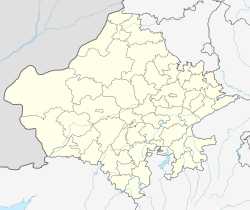Amer, India
| Amer, India | |
|---|---|
| Town | |
| Location within Rajasthan | |
| Coordinates: 26°59′N 75°52′E / 26.983°N 75.867°ECoordinates: 26°59′N 75°52′E / 26.983°N 75.867°E | |
| Country | India |
| State | Rajasthan |
| District(s) | Jaipur |
| Time zone | IST (UTC+05:30) |
Amer (or Amber) (IPA: [ameɾ]; Hindi: आमेर, amer ?), now a part of the Jaipur Municipal Corporation, was a city of the Rajasthan state, India.
The picturesque situation of Amer at the mouth of a rocky mountain gorge, in which nestles a lovely lake, has attracted the admiration of travellers, including Victor Jacquemont and Reginald Heber. It is seen to be a remarkable example for its combined Rajput-Mughal architecture.The Amer Fort, a UNESCO World Heritage Site, is the top tourist attraction in the Jaipur area.
The first Rajput structure was started by Raja Kakil Dev when Amer became his capital in 1036, on the site of present-day Jaigarh Fort. Around 1037 AD, Amer was conquered by the Kachwaha clan of Rajputs. Much of the present structure known as Amer Fort is actually the palace built by Raja Man Singh who ruled from 1590 to 1614 AD. The palace contains several spectacular buildings, such as the Diwan-i-Khas, and the elaborately painted Ganesh Pole built by the renowned warlord Mirza Raja Jai Singh I (Man Singh I's grandson). The old and original fort of Amer, dating from earlier Rajas or the Meena period, is what is known in the present day as Jaigarh Fort, which was actually the main defensive structure rather than the palace itself. The two structures are interconnected by a series of encompassing fortifications.
...
Wikipedia


